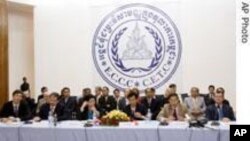Judges at the Khmer Rouge tribunal are prepared to begin investigating additional suspects beyond those already in custody, an official for the UN-backed court said, but it remains unclear whether any more leaders of the regime will ever be brought to trial.
The question of further indictments beyond five suspects already in detention has put tribunal judges at odds in the past and led to warnings by Prime Minister Hun Sen on national instability.
While the tribunal has been mainly focused on the trial of those five leaders, “investigators have started studying the case files for Case 003 and Case 004,” said Lars Olsen, a spokesman for the tribunal. “Concrete investigative steps are expected to start in some weeks’ time.”
Case No. 002, which is not expected to go to trial until 2011, involves jailed leaders Nuon Chea, Khieu Samphan, Ieng Sary, Ieng Thirith and Kaing Kek Iev. Cases beyond that involve suspects that have not been detained.
The names of the suspects in the third and fourth cases have not been publicly announced, and it remains to be seen how far any investigation will go in the face of opposition from Hun Sen and some Cambodian judges.
Court observers say more arrests won’t happen if the decision is split between Cambodian and UN judges, thanks to rules of the court requiring majority decisions. And critics continue to doubt the court’s ability to operate without government interference.
“If the international community does not have influence over the government in ceasing them from interference in Khmer Rouge court procedures, the government benefits,” said Seng Theary, co-director of the Center for Justice and Reconciliation. “And if the international community pulls away, we also think the government benefits. But ultimately, who loses? We as the Khmer people, we as victims, who lost parents, brothers, sisters, relatives, the entire nation.”
The international community must not abandon the court or let it fall to “political games,” which can make the people tire of the proceedings and lose confidence in the court and each other, she said.
“I am so fearful that it could happen if the international community walks away [and] if the government continues to interfere in [court] procedures, which they are not supposed to do,” she said.




